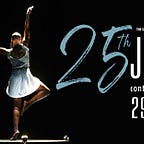RE-IMAGINING BLACK FEMALE EMBODIMENTS FROM AN AFRICAN PERSPECTIVE
By Samkelisiwe Nxumalo
Impressive work by one of the JOMBA! On The Edge awardees this year, Marcia Mzindle, who is a choreographer and a traditional healer in training. Her work “INTO EMDAKA” is available, until the end of the 2023 edition of the festival, on its YouTube channel…
What a mind-blowing and inspiring performance!
“INTO EMDAKA” explores constructed ideas and ideals of Black femaleness as something that is dirty or unclean. Mzindle, who is undergoing ubungoma (sangoma training) describes her work as a negation of her shifting identities as Black, as woman/female and as a traditional healer in training. Through the work, audiences are invited into a visual feast that references her Zulu culture and some of its icons relative to her development as a traditional healer. In one of her settings, we see a mat, calabash, and a djembe drum all of which are synonymous with some of the rituals performed by traditional healers. They also use salt which is seen as a powerful mineral to remove and protect healers from bad spirits; that is why she uses salt water and her a grass made broom at various places in the performance.
She explores her own intersectional oppressions through societal perceptions of Black women as unclean or dirty. The work really resonated with me, on a personal level, because it represents hardships that I have also experienced as a Black young female, raised by a traditional healer in a so-called lower-class family. The title of the work comes from the labels imposed upon us when you are a woman in a racist and patriarchal world. In this context, Black women are undermined and their worth reduced to associations related to constructed ideals of humanity (that have tended to exclude and marginalise Black women). Mzindle explores this most powerfully when she stands, immobile with a dictionary of words projected over her silhouetted figure, in primary colours. These words (some positive and others negative), imposed on her body imprison her, reduce her and render her silent — and this is a powerful commentary on contemporary social hierarchies and where Black young women are placed.
Her fusion of contemporary dance language in relation to iconic movements related to local traditional healers offers a sense of her own complex struggles. The push and pull between contemporary and traditional weaves a tangled web of identity that Mzindle gently unravels through her performative exploration of self as she tugs on historical threads that have excluded her as a Black young woman from understandings of what constitutes humanity and humanness.
In the video she peels off something like a translucent glue which has been pasted on her body, this is both a painful and liberating image. Watching her skin pull and distort as she removes the glue-like substance makes me cringe — it looks sore! Though, as she peels back the layers, picking off the residue — the mood of her work begins to shift — there is a liberatory sense of possibility that surfaces.
In an act of gentle defiance against violence, she ritualistically cleans an imposing representation of violence and violation — a statue of King George V — that still bears the remnants of the 2015/6 #feesmustfall and #rhodesmustfall movements that forced our country’s institutions to revisit the recurring violence of these symbols of colonial terror.
Our lives as black women are controlled by men. Institutions like religion, patriarchal tradition and culture are used to keep us in our so-called place, where decisions are made for us and not by us. In her work, Mzindle includes imposing presences of men, a section that stands out to me, is where she shows men sitting in a row as she passes them. This is a common enough sight in our rural areas when women are going to the shop. As she passes them, all eyes are on her; cat-calling and name-calling ensue — her body absorbs these and I am left to ponder the weight of these words, the labels and expectations that Black young women absorb as they move through life. Although the work is a critique on our historical and contemporary institutions and systems of oppression, Mzindle also encourages us to contemplate other more positive possibilities — ones that empower our Black young women and create new understandings that liberate Black young female bodies so that we break the cycles of dehumanisation and invisibility that shroud us.
“INTO EMDAKA” is available on the festival’s YouTube channel until the end of this year’s 25th Anniversary Edition. It is free to stream, and it will have you in deep thought about the state of our contemporary lives!
